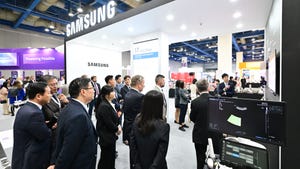C Spire opens up about its 5G rollout
C Spire is using equipment from Nokia to deploy non-standalone 5G across its PCS, 700MHz and 600MHz spectrum holdings, with plans to add 28GHz in the future.

C Spire – one of the largest regional wireless network operators in the US – is using Nokia equipment to deploy 5G across its PCS, 700MHz and 600MHz spectrum bands, just in time for the launch of the new 5G-capable iPhone.
However, the company is keeping expectations modest.
"We're deploying 5G at a variety of spectrums – so many customers will have a faster experience on a 5G network while others may still see the best performance on our 4G LTE deployments," explained Brian Caraway, general manager of C Spire's wireless division, in a release.
Those comments acknowledge a painful truth among network operators: Most initial 5G offerings in the US on lowband spectrum aren't much faster than existing 4G networks. "5G is a new technology that will improve with time, but regardless of where you live, C Spire is dedicated to providing the best network experience for the most customers possible," Caraway said.
C Spire said its 5G efforts stem from $200 million spent on recent 4G and 5G network enhancements that include the deployment of new 2.5GHz spectrum as well as the addition of new technologies like carrier aggregation and 256 QAM.
C Spire also plans to deploy 5G on its 28GHz millimeter wave (mmWave) spectrum holdings at some point in the future. This highband spectrum can support blazing-fast speeds, but suffers from relatively short transmission ranges.
C Spire said its initial 5G rollout will start in select Mississippi markets this year and will expand to other, unspecified markets next year.
"As a privately-held company, we do not publicly disclose more detailed information about our plans for providing 5G until the service is available to customers," the company wrote in response to questions from Light Reading.
C Spire's overall rollout plans largely dovetail with similar efforts by its larger rivals. For example, C Spire said it will likely use Dynamic Spectrum Sharing (DSS) technology in the future "as needed." Verizon recently switched DSS on nationwide, while AT&T has been testing it in some markets. T-Mobile, meantime, has said it will avoid DSS as it deploys 5G on its 600MHz and 2.5GHz holdings.
Like AT&T and Verizon, C Spire said it is using the non-standalone (NSA) version of 5G for its initial launches and will be testing and potentially launching the standalone (SA) version of 5G next year. T-Mobile, for its part, switched on SA earlier this year.
And like AT&T and Verizon, C Spire said it is "interested" in open RAN technology – which promises to separate 5G hardware and software, potentially lowering costs – "but it is not a technology we are currently deploying in our network."
As for offering fixed wireless Internet services over its new 5G network – as T-Mobile and others plan to do – C Spire said its initial 5G efforts are targeted at mobility services, but that "does not limit or prohibit our use of other 5G services like fixed wireless 5G."
Finally, it's worth noting that C Spire now officially joins the ranks of 5G operators. The carrier claimed to be the first in the US with 5G in 2018, though it did so with fixed wireless equipment using proprietary technologies based on the 802.11 Wi-Fi standard.
C Spire provides wireless service to roughly 1 million customers across Mississippi, Alabama and elsewhere. The operator sits behind U.S. Cellular – which counts around 5 million customers – as one of the nation's biggest regional wireless network operators. U.S. Cellular launched its initial 5G services last year.
Related posts:
— Mike Dano, Editorial Director, 5G & Mobile Strategies, Light Reading | @mikeddano
About the Author(s)
You May Also Like












